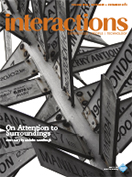Authors:
Meryl Alper, Juan Hourcade, Shuli Gilutz
There is growing global interest in designing technologies for children with disabilities, as evidenced by the recent workshop we organized on this topic at the annual Interaction Design and Children conference [1]. We recognize that in one sense, disability exists at an individual level, be it a temporary, degenerative, or permanent disability, occurring at birth or later in life. But while disability has a distinct medical basis that affects individuals, it is also shaped by cultural, societal, and familial norms. Impairments can be made more pronounced in some social situations, be a tremendous advantage in certain other environments, or…
You must be a member of SIGCHI, a subscriber to ACM's Digital Library, or an interactions subscriber to read the full text of this article.
GET ACCESS
Join ACM SIGCHIIn addition to all of the professional benefits of being a SIGCHI member, members get full access to interactions online content and receive the print version of the magazine bimonthly.
Subscribe to the ACM Digital Library
Get access to all interactions content online and the entire archive of ACM publications dating back to 1954. (Please check with your institution to see if it already has a subscription.)
Subscribe to interactions
Get full access to interactions online content and receive the print version of the magazine bimonthly.






